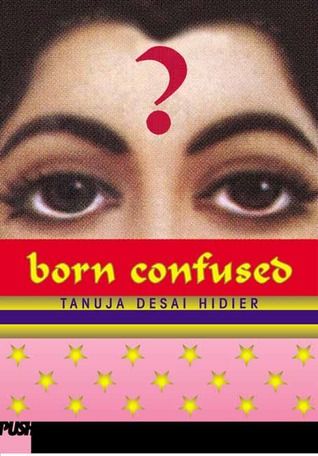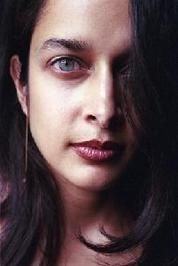 Tanuja Desai Hidier's fantastically acclaimed cross-cultural debut comes to PUSH!
Tanuja Desai Hidier's fantastically acclaimed cross-cultural debut comes to PUSH!Dimple Lala doesn't know what to think. Her parents are from India, and she's spent her whole life resisting their traditions. Then suddenly she gets to high school and everything Indian is trendy. To make matters worse, her parents arrange for her to meet a "suitable boy." Of course it doesn't go well -- until Dimple goes to a club and finds him spinning a magical web . Suddenly the suitable boy is suitable because of his sheer unsuitability. Complications ensue. This is a funny, thoughtful story about finding your heart, finding your culture, and finding your place in America.
Title: Born Confused
Author: Tanuja Desai Hidier
Publisher: Scholastic
Publication Date: April 29, 2014
RATING: 3/5
Isis' Review:
I would like to thank NetGalley and Push for granting me the opportunity to read ebook in exchange for an honest review. Though I received this e-book for free that in no way impacts my review. I give this book 3.5 stars, but only 3 stars in review (as only whole numbers are accepted) until I see if the typographical errors are corrected in the finished copy from Push.
What I like About This Story:
This is a lovely story about figuring out who you are, or at least the first solid steps, since we are continually evolving throughout our lives. Dimple's best friend is her opposite. Gwyn is tall, thin, with blond hair and blue eyes. She is the American ideal. And to top it off she has the personality to match, outgoing, bubbly, open, engaging, effervescent. In short Dimple thinks Gwyn is incandescent, the bees-knees, the sunshine under which she flourishes. Dimple considers herself to be a wallflower, as she never seems to know what to say, or what to wear for that matter. It doesn't help her already stunted self-esteem that she has womanly curves. Not slightly curves, but all-out hourglass curves. And when she looks around she sees white girls that are tall and thin, thin, thin. So she is constantly comparing herself to Gwyn and others like her and coming up short, so to speak. She doesn't feel like an American, but she doesn't feel like an Indian either, so she feels as if there is no place she fits.
Dimple is sweet and wholesome. Her character is so naive that it's to the point of almost being too over the top. But she has a good heart. Once her blinders start coming off she becomes an even more enjoyable character. It takes her looking outside her own messy feelings to get the beginning of a grasp on the similarities between all people, regardless of ethnicity, body type, skin/hair/eye color - underneath we all have a heart, a pair of lungs, muscles, teeth, bones, etc. Even Dimple's cousin and parents show insecurities that sail right over her oblivious head.
On the surface Gwyn is a good foil for Dimple, demonstrating that no matter what your exterior looks like you can still feel you are never _fill in the blank_ enough. Yet each girl is so wrapped up in their own internal insecurities they are blind to the fact that everyone else is going through the same thing at some level. Neither girl recognizes that they are envious of one another. Eventually things come to a head and the two girls finally let out some of their frustration, anger, and accumulated slights that they attribute to the other. This serves to illustrate how bad it is to keep your feelings bottled up, yet it also shows that you will survive airing things out with the party causing them, even if it means risking permanent damage to the relationship.
Karsh, Kavita, and Zara Thustra (who can resist a character named after part of the title of a Friedrich Neitzchie book?), are all great characters. Each help Dimple find herself in one manner or another. And each is also flawed to some degree, some more than others.
A series of events happen that make Dimple finally look around, really pay attention to the world and people in her sphere. This in turn leads to a cascade of mini-epiphanies almost daily, and with each one another piece of her life falls into a more comfortable relationship with the rest of her. Suddenly she discovers connections where she'd never before noticed them, opening up her eyes to her own personal growth as well as the growth of those around her. Growth and changes that are not solely limited to her age group either.
What Didn't Work For Me:
While I loved Dimple's devotion to Gwyn, I felt that the relationship was very unbalanced. It frequently felt as if Gwyn was simply taking advantage of Dimple - "borrowing" and of her clothes that she liked, doing the same with Dimple's jewelry, even going so far as to try to appropriate her very culture and 'be more Indian.' It often seemed that is was all about Gwyn, and she only contacted Dimple when she needed something. Though this behavior is explained, somewhat, that still didn't seem to justify her treatment of such a loyal friend.
Conversely I wanted Dimple to wake up and smell the coffee. It astounded me how she let Gwyn walk all over her. If she did get frustrated she stuffed it down deep and went right back to basking in the glow that was Gwyn. Dimple was clearly partly to blame for Gwyn's treatment of her.
Although Karsh was wonderful I was a wee bit disappointed that the story was set up so that Dimple's happiness hinged on "getting her man." That's not to say she didn't grow by leaps and bounds in other ways, but giving another person so much power over her happiness seemed to defeat the purpose.
My final pet peeve was two-fold: the frequent use of non-English words that were not explained or made clear by their context, and the tremendous amount of typos. One can only hope the typos are restricted to the ebook and not the print version. Plus, this is an advance release copy, so hopefully all the typographical errors will be cleaned up before the release of the final product.
Overall Impression:
A wonderful, meaningful story about coming to terms with growing up. The fact that the lessons weren't restricted to just one age group or ethnicity was a very nice bonus, as it helped demonstrate that we all struggle with many of the same
issues. They may not be exactly the same, but odds of finding someone who isn't going through the same thing, or went through it, are slim to none. There are some sections where Ms. Tanuja Desai Hidier crafted some remarkable phrases, creating absolutely vivid images that made the entire book come to life. One such example is as follows -
<blockquote>History wasn't that easy a thing to learn, seemed to be what I was learning. It wasn't a static story about dead people. It was a revolving door fraught with ghosts still straining to tell their version and turn your head, multifaceted and blinding as a cut diamond.</blockquote>
All in all I found this to be a great teaching book, without feeling like you are being preached to or deliberately taught any lessons. I would certainly recommend this book for high school libraries (not middle school due to some discussions about sex, as well as underage drinking and one incident of drug use).
 TANUJA DESAI HIDIER is a writer and musician based in London, via NYC.
TANUJA DESAI HIDIER is a writer and musician based in London, via NYC.Her first novel, BORN CONFUSED--the first ever South Asian American coming-of-age story--was a Larry King pick of the week, an American Library Association BBYA book of the year, and a Sunday Times (Times of London) book of the week. The book has been translated into Swedish, Norwegian, Finnish, Italian, German, and various South Asian languages, and was recently exhibited at the Queens Museum of Art as part of the Her Stories: Fifteen Years of the South Asian Women’s Creative Collective exhibition. Tanuja has adapted BORN CONFUSED into a screenplay.
She wrote and directed the award-winning short film The Test. Her short stories have been included in numerous anthologies, including the London Writers/Waterstones anthology, Sixteen: Stories About That Sweet and Bitter Birthday, Big City Lit’s celebration of a decade of Asian-American writing, Friends: Stories About New Friends, Old Friends, and Unexpectedly True Friends, Basilisk.com, Daunt Bookstore's Short Story Anthology, The Lisa Libraries Collection, and Desilicious: South Asian Erotic Writing, the latter for which she was featured on BBC1’s program Desi DNA.
Tanuja has been a recipient of the London Writers / Waterstones Award and the James Jones First Novel Fellowship Award. Soon after BORN CONFUSED launched, Time Out New York brought her on board as Guest Consulting Editor for their groundbreaking issue: Time Out New York's South Asian New York Special. Tanuja was also a finalist for the Asian Women of Achievement Awards for the United Kingdom and was voted one of the 50 Coolest Desis in the world by Desiclub.com. She is currently at work on the Bombay-based sequel to BORN CONFUSED, as well as an album of new songs to accompany the book



No comments:
Post a Comment